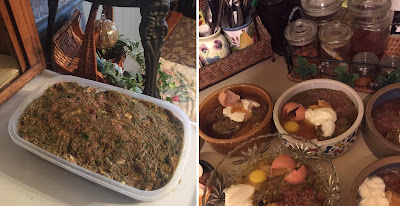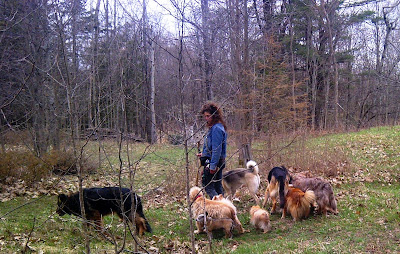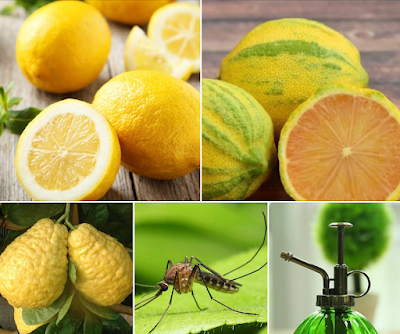Garlic for Dogs - Health Benefits, Preparation, Use, Safe Dosage
A guide to using garlic for your dog and cat. Garlic is a natural medicinal herb for dogs and cats. In this article you'll learn how to use garlic to support your dog and cat's health naturally.
★ 10 min read
In this article:
- Why Garlic is Good For Dogs The Truth About Garlic for Dogs
- The Debate About Garlic
- Thiosulphate and Heinz Factor Anemia
- Warning - Japanese Dog Breeds
- Scientific Research, What Does Science Say? Fear Garlic or Not? NOT.
- To Good to Ignore
- How About Garlic for Cats?
- History and Types of Garlic for Dogs and Cats
- Health Benefits of Fresh Garlic
- Medicinal Compounds in Garlic
- Activate The Medicinal Properties of Garlic
- Instructions to Prepare Garlic, for Optimal Medicinal Value
- Types of Garlic You Should Not Use
- How to Include Garlic In Your Dog's Daily Diet
- Dosage Guidelines
- How To Include Garlic In Your Cat's Diet
- Cautions
- Drug Interactions
- How to Use Garlic For Personal Care Treatments for Dogs
- Natural Wormer
- Flea, Tick, Mosquito Repellent Aid
- Ear Infection Treatment
- Ear Mite Infestation Treatment
- Conventional Flea, Tick, Heartworm and Intestinal Wormers
- Conventional Preventatives, A Serious Threat to Your Dog and Cat's Health
- Heartworm Preventatives
- Flea, Tick, Intestinal Parasite Preventatives and Treatment
You may have heard that garlic is bad
for dogs, but in actual fact garlic is good for dogs.
1.1 The Truth About Garlic for Dogs
1.1.1 The Debate About Garlic
The debate about whether garlic is good or bad seems to have arisen from
confusion with its close cousin, the onion. And that question has been furthered by people - professionals and public alike - who do not inform themselves about the actual properties of these foods prior to pronouncing their opinion.
Which means that their pronouncement is an OPINION and an uninformed judgment based on lack of information rather than an evidence-based fact.
Which means that their pronouncement is an OPINION and an uninformed judgment based on lack of information rather than an evidence-based fact.
1.1.2 Thiosulphate and Heinx Factor Anemia
Both garlic and onion contain
thiosulphate. Thiosulphate is the substance responsible for causing ‘Heinx Factor’ anemia in
dogs and cats.
The amount of thiosulphate found in garlic is much lower than in onions, in fact the amount in garlic is barely traceable. For the majority of dogs garlic dosing within recommended guidelines (see further below) does not result in dangerous levels of thiosulphate.
The amount of thiosulphate found in garlic is much lower than in onions, in fact the amount in garlic is barely traceable. For the majority of dogs garlic dosing within recommended guidelines (see further below) does not result in dangerous levels of thiosulphate.
1.1.2.1 Warning - Japanese and Korean Dog Breeds
The only dog breeds that should not be given garlic are Japanese and Korean dog breeds. For example the Akita and the Shibu Inu as these breeds are hypersensitive to thiosulphate.
1.1.2.2 Scientific Research, What Does Science Say? Fear Garlic or Not? NOT.
1.1.2.2 Scientific Research, What Does Science Say? Fear Garlic or Not? NOT.
The NCIB (National Center for Biotechnology Information) provides scientific research regarding safe use of garlic for dogs. None of the dogs in the study developed Heinz Factor. You can read the research paper here.
The fear of garlic as a healthful herb for dogs is a new fear propagated by rumor on the internet and not proven by any facts or study. To see an extensive list of foods that dogs should truly not be consuming and/or should be consuming with caution, read here.
The fear of garlic as a healthful herb for dogs is a new fear propagated by rumor on the internet and not proven by any facts or study. To see an extensive list of foods that dogs should truly not be consuming and/or should be consuming with caution, read here.
1.1.3 To Good to Ignore
Garlic
is a powerful, natural
broad-spectrum antibiotic. Garlic is also an antioxidant, anti-allergen,
antibacterial, anti-fungal, anti-protozoan, anti-viral and
anti-carcinogen. Garlic contains germanium, an anti-cancer agent and an
anti-protozoan. Garlic can
also be used topically to treat specific ailments - for example ear mite infestation and ear infections.
Garlic also contains sulfur - a natural insect repellent. More on this further below.
When garlic is ingested in reasonable amounts (refer to dosage guidelines further below), there are NO harmful results - only benefits.
When garlic is ingested in reasonable amounts (refer to dosage guidelines further below), there are NO harmful results - only benefits.
But will my dog smell like garlic?
When your dog eats garlic, your dog's body will not emit the odor of garlic.
Your dog will not smell like a clove of garlic.
2.0 How About Garlic for Cats?
Cats are much more sensitive to thiosulphate
than dogs. Cats are, in general more sensitive to biologically foreign
substances. For example, the range of essential oils suitable for cats
is considerably less than for dogs.
A wise cat may choose to rub up against a patch of wild
garlic for its insect repelling properties.
Garlic can be offered as an ingested herbal supplement for cats, however it is very important to follow the instructions on use and dosing for cats provided further below.
3.0 History and Types of Garlic for Dogs and Cats
Garlic is a member of the allium genus - garlic is considered a vegetable, and a member of the Lily family. Garlic is an ancient food crop - cherished for its vegetable bulb and flower stalk (scape), the garlic plant has been harvested
and cultivated by mankind for thousands of years.
There are many types of garlic - cultivated, heirloom and wild, examples can be found here.
The word garlic comes from the Old English word garleac - ‘spear leek’.
Garlic is divided into two main varieties - hardnecked garlic, and softneck garlic. Hardneck garlic does not store well for long periods of time, but the cloves are easier (than softneck varieties) to peel. Softneck garlic stores very well for longer periods of time, making it the most common type of garlic sold in grocery stores. All information discussed in this article applies to hardnecked and softnecked garlic.
Garlic is also an herbal plant with many health giving properties. Garlic - when used properly, offers many health benefits to dogs.
Unfortunately, all other members of the allium family, including - chives, leeks, shallots and onions are toxic to dogs and cats.
There are many types of garlic - cultivated, heirloom and wild, examples can be found here.
The word garlic comes from the Old English word garleac - ‘spear leek’.
Garlic is divided into two main varieties - hardnecked garlic, and softneck garlic. Hardneck garlic does not store well for long periods of time, but the cloves are easier (than softneck varieties) to peel. Softneck garlic stores very well for longer periods of time, making it the most common type of garlic sold in grocery stores. All information discussed in this article applies to hardnecked and softnecked garlic.
Garlic is also an herbal plant with many health giving properties. Garlic - when used properly, offers many health benefits to dogs.
Unfortunately, all other members of the allium family, including - chives, leeks, shallots and onions are toxic to dogs and cats.
4.0 Health Benefits of Fresh Garlic
Garlic offers a wide range of health benefits used as an ingested medicinal herb and personal care aid.
Nutritive value of garlic includes:
- Garlic is high in vitamins, minerals and nutrients.
- Calcium
- Potassium
- Zinc
- Protein
- Vitamin A
- Vitamin B
- Vitamin B2
- Vitamin C
Garlic is:
Anti-bacterial.
Garlic is an aid for fighting and treating:
Asthma.
Environmental allergies .
Diabetes.
Diarrhea.
Fatigue.
Liver, heart and kidney disease.
Maintenance of healthy liver function.
Ear infections and ear mite infestations.
Stress.
- Garlic helps to prevent a variety of cancers such as: bladder cancer, colon cancer, prostate cancer, lung cancer; rectal cancer, stomach cancer.
- Garlic is also used to treat some forms of cancer such as bladder and prostate cancer.
- Heart disease.
- Heart attack.
- Hardening of the arteries.
Garlic is an aid for fighting and treating:
Asthma.
Environmental allergies .
Diabetes.
Diarrhea.
Fatigue.
Liver, heart and kidney disease.
Maintenance of healthy liver function.
Ear infections and ear mite infestations.
Stress.
5.0 Medicinal Compounds in Garlic
Garlic bulbs and garlic scapes (the green fresh shoots) contain multiple sulfur inclusive compounds. Allinn and another enzyme ‘alliinase’, both
present in garlic, but contained in separate cells gain the opportunity to
combine and create a new enzyme called ‘allicin’ when garlic is chopped,
crushed, minced, or chewed. Allicin (an anti-biotic, anti-bacterial,
anti-cancer, heart healthy enzyme) is the most beneficial of the healthful
enzymes in garlic.
6.0 How To Activate the Medicinal Properties of Garlic
6.1 Instructions to Prepare Garlic, for Optimal Medicinal Value
Then allow the garlic to sit at room temperature for ten to fifteen minutes.
The medicinal properties remain active for up to one hour after you have activated them.
- This gives the allinn and alliinase sufficient time to undergo the enzymic reaction that creates allicin - the medicinal ingredient in garlic.
The medicinal properties remain active for up to one hour after you have activated them.
After one hour, the medicinal properties begin to degrade. For optimal medicinal and health benefits it's important to use fresh minced garlic cloves or scape.
7.0 Types of Garlic You Should Not Use
7.1 Dry, Dehydrated, Powdered, Mixed Garlic, In Brine, Supplement
Don't give your dog garlic steak spice and similar products. This
type of product contains ingredients that are not appropriate for dogs.
Such as: fillers, hidden MSG, sugar, iodized salt, food coloring and
other additives.
Note that dehydrated, air dried or freeze dried powdered or minced garlic or cloves in brine don't provide the medicinal qualities found in fresh, minced garlic.
8.0 How to Include Garlic in Your Dog’s Diet
Garlic (bulb and/or scapes) should always be used as a "self-select" dietary supplement. Allow your dog to indicate if she wants to eat the fresh minced garlic bulb or scape. Offer the garlic to your dog, by placing the fresh minced garlic beside your dog's food. If your dog does not want to eat garlic respect your dog's indication. Like all herbs, not every herb is suited to every dog. Allow your dog to indicate suitability. Learn more about self-selection here.
8.1 Garlic Dosing Guidelines for Dogs
Daily Dosage for Dogs by Body Weight
1 teaspoon (tsp) fresh, raw minced garlic bulb or garlic scape daily per every:
- 30 lbs of body weight
- 13.6 kg of body weight
- 20 pound dog - 2/3 of a tsp
- 15 pound dog - 1/2 of a tsp
- 10 pound dog - 1/3 of a tsp
- 5 pound dog - 1/6 of a tsp
I discourage dosing by clove.
Dosing by clove is not
a good method of dosing as clove size varies depending on the type of
garlic. There are many varieties of garlic including small up to giant
garlic bulbs with very large cloves. Clove size also varies within each
garlic bulb.
9.0 How To Include Garlic In Your Cat's Diet
You can offer a small amount of garlic to your cat 1 to 2 times per week.
No more than 1/16 tsp (for small cats), up to 1/8 tsp (for large cats),
fresh minced garlic (prepared as instructed further in section 5.0 of this article),
administered once per day, one to two times per week.
However, you should only do this if your cat self-selects garlic.
Never force your cat to consume garlic.
Never mix or hide garlic into your cat's food or treats.
Learn how to do self-selection with your cat:
- Go to this article.
Before offering garlic to your cat, make sure you read the other sections of this article.
10.0 Cautions
- When used in the dosage provided above, garlic is safe for pregnant dogs;
- The only caution around garlic for pregnant dogs is that if ingested in large quantities it can flavor the milk of lactating females (human and canine).
- Don't give garlic to puppies that are 6 months of age or younger.
- Under 6 months of age a puppy's red blood cell mass is not mature enough to allow for safe use of garlic.
- Dosing with garlic at 6 months of age or under can trigger hemolytic anemia (all dog breeds).
- Akitas, Shibu Inus and other Japanese dog breeds are more sensitive (than other dog breeds) to enzymes in garlic that can cause hemolytic anemia.
- Avoid use of garlic in Japanese dog breed's diets.
Some garlic grown in China has proven to be contaminated with high levels of arsenic, lead and added sulfites.
Many dogs and cats use their inherent senses to identify if a food, herb, etc, is not suitable for their individual needs.
Learn more about self-selection:
Learn more about self-selection:
- Go to this article.
10.6 Contradictions for Use
- This can make it unsuitable to some individuals with specific health issues and conditions.
- Like all foods and herbs, an individual can be intolerant or hypersensitive (allergic) to specific items, including garlic.
- If your dog has a health or medical condition(s), make sure you check garlic's suitability for your dog's specific circumstances.
11.0 Drug Interactions
11.1 Conventional Drugs
If your dog or cat is on conventional drugs make sure you check for drug interactions - the below is an example of some garlic and drug interactions:
If your dog is on cyclosporine:
- Garlic may increase the rate at which cyclosprine is broken down by the body, and;
- Might decrease the effectiveness of cyclosporine;
- So, do not give your dog garlic if he/she is on cyclosporin.
If your dog is on any medication that is changed by the liver.
If your dog is on a blood thinner:
Garlic can slow down blood clotting - garlic may increase the efficacy of the blood thinner, you may need to adjust the blood thinner dosage.
12.0 How To Use Garlic As A Personal Care Treatment for Dogs
12.1 Wormer
Garlic is a natural wormer and can also be used in combination with other herbs and nutraceuticals to treat repel and avoid the development of parasite infestations.
Learn more about natural herbal wormers for your dog and cat:
- Go to this article.
12.2 Flea, Tick Mosquito Insect Repellent Aid
Garlic is a natural insect repellent and can also be used topically in combination with other herbs and nutraceuticals to treat and repel insects.
Natural herbal insect repellent sprays, dips, rubs:
- Go to this article.
12.3 Ear Infection Treatment
Garlic can be used topically in combination with other nutraceuticals as a topical treatment for ear infections.
Learn more about ear infections and natural treatments:
- Go to this article.
12.4 Ear Mite Infestation Treatment
Garlic oil is a natural treatment for ear mite infestations.
Ear mite infestations and natural treatment:
- Go to this article.
13.0 Conventional Flea, Tick, Heartworm, Intestinal Wormers
13.1 Conventional Preventatives, A Serious Threat to Your Dog and Cat's Health
Conventional flea, tick, heartworm and intestinal wormers pose a serious threat to your dog and cat's short and long-term health.
13.1.1 Conventional Heartworm Preventatives and Treatment
Truth, reality, myths and lies
- Learn how to really assess your dog's risk for heartworm infestation.
- Find out why and how conventional heartworm preventatives leave your dog at high risk of infestation.
- Learn about natural alternatives.
Go to this article.
Truth, reality, myths and lies
- Learn why you should not use conventional oral and topical flea, tick and intestinal parasite products.
- Learn about natural alternatives.
Go to this article.
Holistic Diet, Nutrition, Wellness Services Tailored to Your Individual Dog and Cat
For information about my holistic diet, nutrition and wellness services, visit my holistic wellness services page.
Maintain good health | Address acute and chronic health issues | Pre and post surgery support and recovery
My holistic wellness services are available worldwide via video consultation.
🌎 USA | Canada | UK | Europe | Australia | New Zealand | Asia | South and Central America | Africa | UAE
📱FaceTime | Facebook | Skype | WhatsApp
To set-up your holistic wellness consultation get in-touch via email, go to my contact me page.
Holistic Behavioral Services for Your Dog
For information about my holistic behavioral services, visit my holistic behavioral services page.
For dogs of all ages, sizes and breeds.
My behavioral services are available worldwide via video consultation.
🌎 USA | Canada | UK | Europe | Australia | New Zealand | Asia | South and Central America | Africa | UAE
📱FaceTime | Facebook | Skype | WhatsApp
To set-up your holistic behavioral session get in-touch via email, go to my contact me page.
Affiliations to Companies
✓ None.
✓ I don't sell food, supplements, or other products.
✓ I'm not aligned with any companies.
Article and graphics by Karen Rosenfeld.





















